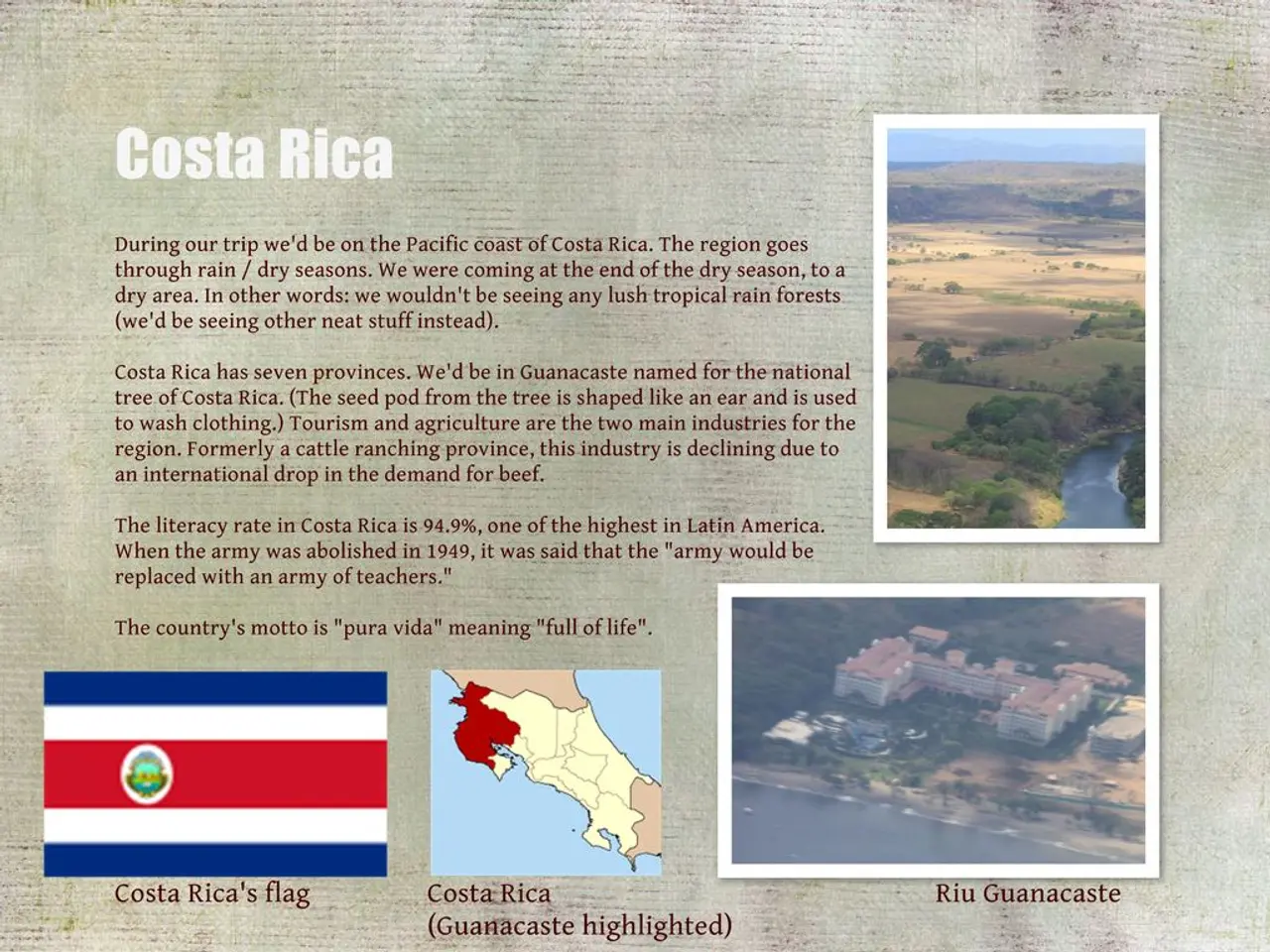Colombia's groundbreaking community initiatives receive prestigious accolades from the United Nations Tourism sector
Colombia Embraces Community-Based Tourism with Sustainability and Innovation
Colombia is making strides in positioning itself as a leader in community-based tourism, with a focus on sustainability and resilience. The "Innovation Challenge: Community Tourism: Colombia" was a significant initiative that involved a series of tourism entrepreneurship competitions, innovation challenges, and technology forums.
The challenge aimed to reach out to entrepreneurs, community-based organizations, and Colombian companies committed to community-based tourism. It sought to identify leaders and ideas that are helping to build an inclusive future for this sector in the region.
The Innovation Challenge encompassed more than 7,000 entrepreneurs, 500 companies, 400 public institutions, 250 educational centers, 40 incubators/accelerators, and 290 investors. The event took place during the 122nd session of the Executive Council and was organized with the collaboration of Colombia's Vice Ministry of Tourism and the National Tourism Fund (FONTUR).
In the category of Women and youth, Lunaris from Nariño was a winner. They highlight the beauty of the El Charmolan Nature Reserve through conservation and visual storytelling. In the category of Ethnic communities, Chiritour from Chocó was a winner, offering a cultural journey highlighting local traditions along the Atrato River. The category of Rural and urban communities saw Comunidad del Encanto from Boyacá as a winner, connecting eight communities through gamified tourism experiences.
However, specific details about winners or prizes for each category in the 2025 Innovation Challenge on community tourism in Colombia are not readily available. One example of a sustainable community tourism project supported by a separate initiative is the La Ruta del Roble project at Ecofinca Las Villas in Colombia. This project links municipalities through sites inviting visitors to explore oak forests, supports 160 farming families, and focuses on coffee, plantains, citrus, and home gardening for regional food sustainability.
The UN's Department of Innovation, Education, and Investment developed the UN Tourism Startup Competitions, UN Specific Challenges, and UN Tourism Tech Adventures, which align with the Sustainable Development Goals (SDGs) of the United Nations. UN Executive Director of Tourism, Natalia Bayona, emphasized that community-based tourism empowers people from various backgrounds, including women, youth, and post-conflict social groups.
The Innovation Network generated more than US$74 million in funding for new businesses and aims to drive the creation of opportunities, as highlighted by Bayona. The challenge concluded during the 122nd session of the Executive Council, and a special ceremony was held in Cartagena de las Indias to announce the winners.
For those interested in sustainable community tourism projects in Colombia supported by grants or mentorship programs for innovation, the La Ruta del Roble project at Ecofinca Las Villas represents a strong example combining sustainability, local involvement, and tourism development. For more information about specific challenge winners, it is recommended to check official Colombian tourism or innovation challenge platforms or Planeterra updates beyond the August 2025 information available here.
[1] La Ruta del Roble: https://www.planeterra.org/programmes/colombia/la-ruta-del-roble/ [2] Technology and innovation in education in Colombia: https://www.colombia.travel/en/news/colombia-leads-in-technology-and-innovation-in-education
- Colombia is striving to become a pioneer in community-based tourism, focusing on sustainability and resilience, as demonstrated by the "Innovation Challenge: Community Tourism: Colombia."
- The Innovation Challenge, organized with collaboration from Colombia's Vice Ministry of Tourism and the National Tourism Fund (FONTUR), attracted over 7,000 entrepreneurs, 500 companies, 400 public institutions, 250 educational centers, 40 incubators/accelerators, and 290 investors.
- The challenge aimed to find leaders and ideas contributing to an inclusive future in community-based tourism and involved tourism entrepreneurship competitions, innovation challenges, and technology forums.
- Lunaris from Nariño, a winner in the Women and youth category, uses conservation and visual storytelling to highlight the beauty of the El Charmolan Nature Reserve.
- Chiritour from Chocó, winner in the Ethnic communities category, offers a cultural journey showcasing local traditions along the Atrato River.
- Comunidad del Encanto from Boyacá, a winner in the Rural and urban communities category, connects eight communities through gamified tourism experiences.
- The UN's Department of Innovation, Education, and Investment has developed programs such as the UN Tourism Startup Competitions, UN Specific Challenges, and UN Tourism Tech Adventures, which align with the Sustainable Development Goals (SDGs) of the United Nations.
- The La Ruta del Roble project at Ecofinca Las Villas, supported by a separate initiative, serves as a sustainable community tourism project example that links municipalities, involves local communities, and promotes tourism development while focusing on regional food sustainability.




